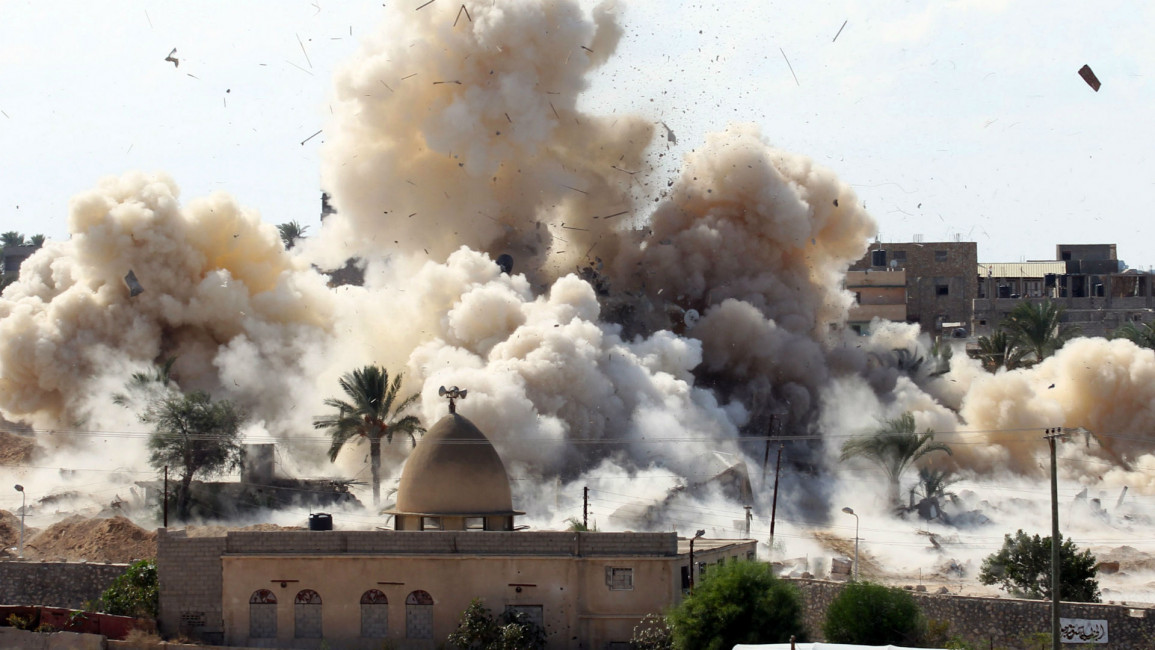
Burning Sinai and burying the spectre of Morsi
From the war for Sinai to the war on Sinai, Egypt is hurtling towards rock bottom. People are starting to wake up to the idea that the Egyptian government finds the kidnapping of three Israeli settlers in the West Bank worse than a massacre in Egypt itself, let alone the displacement and crushing of hundreds of Egyptian families in Sinai.
Egypt once fought for the right of Palestinians to return to their stolen land. But today the Egyptian state is committing its own brutal operation against Egyptians in Sinai to "transfer" populations. Egyptians in Sinai have already paid a high price on behalf of all Egyptians in Egypt's three wars against Israel.
Shortly before this latest disgrace, social media echoed with the cries and recriminations of media personalities who now serve the coup-installed regime, accusing ousted President Mohammad Morsi of jeopardising Egypt's national security by using military force to deal with the abductors of Egyptian soldiers in May 2013. They said Morsi's decision breached the peace treaty with Israel.
Today, the same voices applaud the military incursion in Sinai to displace and punish its residents, but no one has batted an eyelid over this breach of the Camp David peace treaty.
Current events in Sinai are no longer about the retaliation for the killing of, if one believes the official figures, dozens of soldiers. These deaths have been used to justify a comprehensive plan to change the demographics of Sinai, and a distraction from other catastrophes planned for the rest of Egypt.
The Sinai crisis is not taking place in isolation. It is happening along with other crises in Cairo, fuelled by an attempt to eradicate any signs of protest in Egypt.
Sisi moves against all opposition
| Egypt once fought for Palestinians' right of return to their stolen land, but today Egypt is committing its own brutal population transfer. |
The question here is why is President Abdel Fattah al-Sisi militarising the judiciary, and issuing collective death sentences against hundreds of his opponents?
The Egyptian regime passed its recent oppressive laws not just to impose its tyrannical power on everything it can. The regime is also obviously preparing for worse atrocities in the future, after its Universal Periodic Review session at the United Nations Human Rights Council on 5 November.
After this hearing, Egypt will likely witness an unprecedented period of oppression and torture. The regime will finally and definitively extinguish the dying embers of the 25 January revolution. It will continue to crack down on civil society and human rights organisations attempting to work with a degree of independence and neutrality. The major catastrophe will then follow: the execution of the former freely elected president, Mohamed Morsi, and a large number of leading Muslim Brotherhood figures.
A careful reading of the content and timing of the new presidential decrees regarding the militarisation of state institutions and genocides, and military trials on civilians, all clearly show the intensive efforts to deal a severe blow to opposition - to overwhelm all current and possible opponents of the military regime by shock and awe. The regime wants to eliminate all who presently oppose it by killing or imprisoning them. It also wants to intimidate anyone who might resist in the future.
The regime has two goals. The first is to destroy the dream of restoring democracy. The second is to destroy the idea that a freely elected president could once again lead Egypt, while normalising the idea that state institutions could be turned against a president. After it has worked itself up to this hysterical state, the regime will most likely not hesitate to shed more blood.
Opinions expressed in this article remain those of the original author and do not necessarily reflect the opinions of al-Araby al-Jadeed, its editorial board or staff.
This is an edited translation from our Arabic website.




